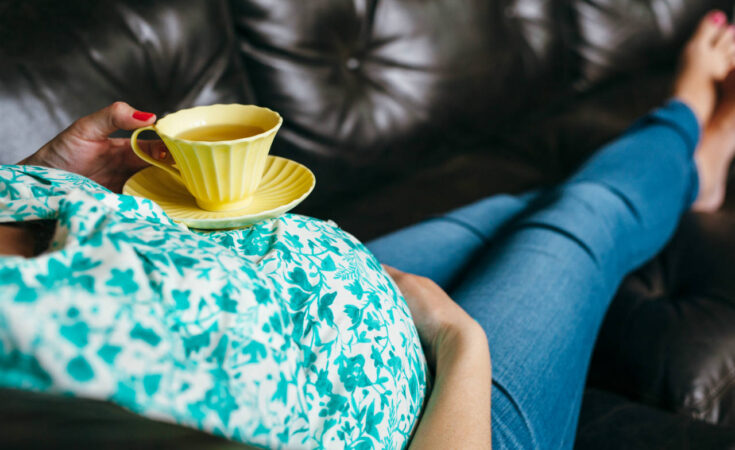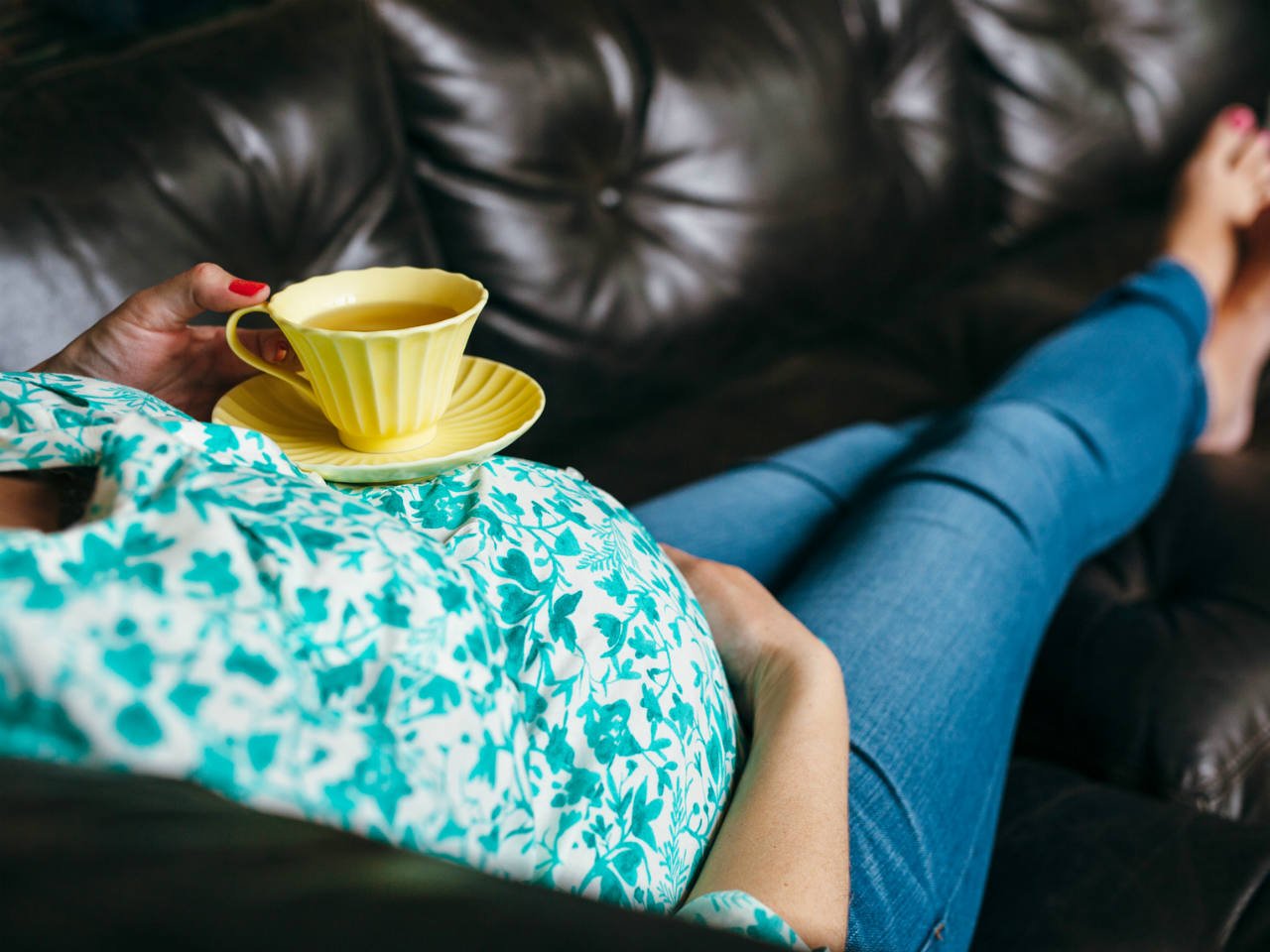Constipation is often an early sign of pregnancy, and sometimes it continues for all nine months (sorry!). Here’s what you can do to get relief from pregnancy constipation.
Both of Adele Hedrick’s pregnancies were marred by months of cramping, bloating and gassiness thanks to constipation, which affects 11 to 38 percent of pregnant women. “It added so much more discomfort to pregnancy,” says the Bowmanville, Ont. mom of two. When she developed painful hemorrhoids as a result of straining, Hedrick knew it was time to put some serious effort into softening her stools. “I focused on drinking lots of water and eating whatever fibre I could get my hands on,” she says. “All-Bran was my best friend.”
What causes pregnancy constipation
When you become pregnant, rising levels of the hormone progesterone slow your digestive system to a snail’s pace, and for good reason: your body is absorbing the extra nutrients and fluids it needs to grow a healthy baby. The result, though, is harder stools that are more difficult to pass. This happens so early that it is a first sign of pregnancy for some women, says Suzanne Wong, an OB/GYN at Toronto’s St. Joseph’s Health Centre.
In your second and third trimesters, pressure from your growing uterus on your bowels can exacerbate the problem, and that extra iron and calcium in your prenatal vitamins are binding, so they’re not doing your situation any favours, either. And if you suffered from constipation prior to pregnancy, there’s a good chance you’ll suffer in pregnancy. “The risk of becoming constipated is enhanced if you have a predisposition to it,” says Wong.
While it can make you feel all sorts of awful, it’s rare constipation will lead to anything dangerous. The most severe cases might result in hemorrhoids and anal fissures, caused by pressure on the veins around the rectum; these cause pain and discomfort but don’t put you or your baby in any danger. And there are plenty of natural ways to curb constipation before it gets to that point—prevention, says Wong, is key.
What to do if you get constipated
The best line of defence, according to Calgary registered midwife Nicola Strydom, is threefold: a high-fibre diet, plenty of fluids and moderate physical activity.
Eat a high-fibre diet
“We recommend whole grains and at least five portions of fruits and vegetables a day,” says Strydom. For some, that’s easier said than done: “I couldn’t stand greens while pregnant,” says Hedrick. “The absence of them likely contributed to my constipation.” But there are enough high-fibre foods that if you develop an aversion to one, you can surely pick up the pace with another. Consider dried fruit, hummus, oatmeal, lentils and bran.
Drink plenty of fluids
It’s recommended that women drink 10 cups of fluids daily during pregnancy, but if you think that much water is too much to down, don’t worry—other liquids count too. Often something warm first thing in the morning, like herbal tea or hot lemon water, is enough to get things going.
Try moderate physical activity
You needn’t embark on a complicated or time-consuming exercise routine to solve your constipation woes. Experts say adding a 20- to 30-minute walk each day can be enough to stimulate digestion.
Change or add supplements
If you’re eating well and exercising, and you’re still constipated, Strydom suggests changing vitamins until you find a brand that’s less constipating. A fibre supplement like Metamucil can also get you out of your bind and is considered safe in pregnancy. Never take a laxative or stool softener to treat constipation, though, without first speaking with your health care provider, says Wong.
While Hedrick found temporary relief in water and All-Bran (“I sprinkled it on everything,” she says), long-term relief didn’t come until after delivery when she was able to return to her pre-pregnancy diet, which included “a lot of dark, leafy greens” as opposed to “fully loaded cheeseburgers.” Despite her experience, though, Hedrick says she’d do it all over again: “There are no pregnancy discomforts that could have held me back from having children,” she says.
Postpartum constipation—you’re not done pushing yet
Delivery doesn’t necessarily mean an end to your constipation woes. (And be warned: the first bowel movement post-delivery can require some courage. If you delivered vaginally, your perineal area is still healing, and you’ll want to be careful not to disturb any stitches.) The combination of extra iron supplements (to make up for any blood loss), narcotics (in the case of a C-section), limited mobility (because, well, you just had a baby) and a fear of pain while straining to go can all contribute to postpartum constipation. If this is the case, says Wong, the same rules of pregnancy constipation apply: stick to high-fibre foods (aim for 25 grams a day), hydrate and move around as much as you can. And finally, if you’re offered a stool softener right after delivery, accept it. Trust us on this one.
This article was originally published in August 2017 and has since been updated.
Stay in touch
Subscribe to Today’s Parent’s daily newsletter for our best parenting news, tips, essays and recipes.
= 0;if(!is_postback){return;}var form_content = jQuery(this).contents().find(‘#gform_wrapper_13’);var is_confirmation = jQuery(this).contents().find(‘#gform_confirmation_wrapper_13’).length > 0;var is_redirect = contents.indexOf(‘gformRedirect(){‘) >= 0;var is_form = form_content.length > 0 && ! is_redirect && ! is_confirmation;var mt = parseInt(jQuery(‘html’).css(‘margin-top’), 10) + parseInt(jQuery(‘body’).css(‘margin-top’), 10) + 100;if(is_form){jQuery(‘#gform_wrapper_13’).html(form_content.html());if(form_content.hasClass(‘gform_validation_error’)){jQuery(‘#gform_wrapper_13’).addClass(‘gform_validation_error’);} else {jQuery(‘#gform_wrapper_13’).removeClass(‘gform_validation_error’);}setTimeout( function() { /* delay the scroll by 50 milliseconds to fix a bug in chrome */ jQuery(document).scrollTop(jQuery(‘#gform_wrapper_13’).offset().top – mt); }, 50 );if(window[‘gformInitDatepicker’]) {gformInitDatepicker();}if(window[‘gformInitPriceFields’]) {gformInitPriceFields();}var current_page = jQuery(‘#gform_source_page_number_13’).val();gformInitSpinner( 13, ‘https://www.todaysparent.com/wp-content/plugins/gravityforms/images/spinner.gif’ );jQuery(document).trigger(‘gform_page_loaded’, [13, current_page]);window[‘gf_submitting_13’] = false;}else if(!is_redirect){var confirmation_content = jQuery(this).contents().find(‘.GF_AJAX_POSTBACK’).html();if(!confirmation_content){confirmation_content = contents;}setTimeout(function(){jQuery(‘#gform_wrapper_13’).replaceWith(confirmation_content);jQuery(document).scrollTop(jQuery(‘#gf_13’).offset().top – mt);jQuery(document).trigger(‘gform_confirmation_loaded’, [13]);window[‘gf_submitting_13’] = false;}, 50);}else{jQuery(‘#gform_13’).append(contents);if(window[‘gformRedirect’]) {gformRedirect();}}jQuery(document).trigger(‘gform_post_render’, [13, current_page]);} );} );]]>
Read The Full Article Here



































